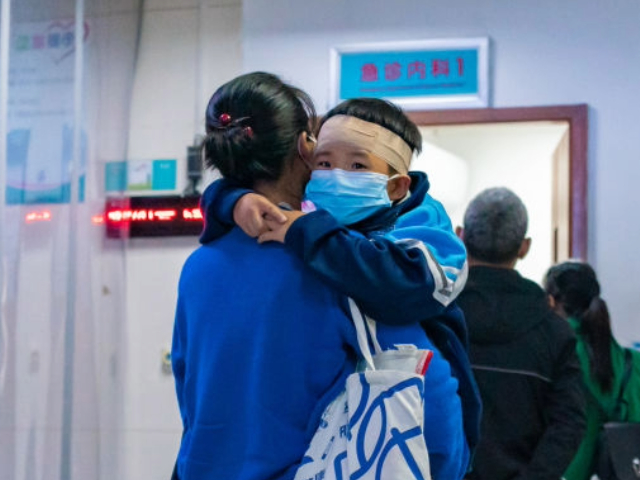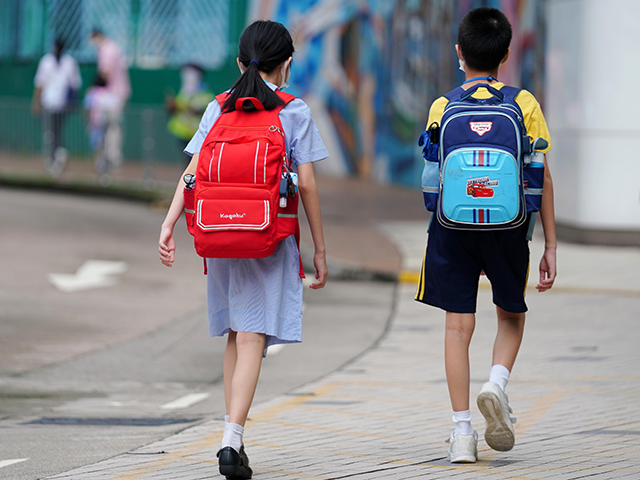China’s Ministry of Education issued a directive on Tuesday for its schools to “enhance the awareness of daily protection and health monitoring” in response to an ongoing surge in child pneumonia cases nationwide, appearing to most severely affect Beijing and northeast China.
The Chinese Communist Party has insisted since late November, when reports of overcrowded hospitals and concerns of insufficient medical resources began surfacing, that the increase in such cases was a result of the spread of several known diseases – such as influenza and pathogens that cause common colds, such as adenovirus and rhinovirus – and not any new illnesses.
China’s Global Times, a state propaganda outlet, once again reported on Tuesday that the Party has no evidence of the discovery of a novel pathogen and listed the aforementioned viruses alongside respiratory syncytial virus (RSV) and mycoplasma pneumonia, a bacterial infection, among the most common diseases.
Chinese public health experts quoted in state media have attributed the high number of pneumonia cases to what they call an “immunity gap.” As a result of China’s tyrannical “zero-covid” restrictions, which forced millions into months-long stages of house arrest with minimal food or medicine and required the imprisonment of coronavirus patients in quarantine camps, the Chinese population missed years of normal exposure to pathogens that enhances the body’s immune response to them.
The “immunity gap” is presumed to be especially severe in children born during the lockdowns, who have not received such exposure in their entire lives.
Notably, Chinese state publications have omitted mention of Wuhan coronavirus among the diseases causing the surge in hospitalizations.
Scenes of panicked parents rushing to hospitals without the space of their children, government demands for citizens to begin wearing sanitary masks and engaging in “social distancing,” and the return of disinfection crews on the streets of major cities have caused significant alarm in China, however, as citizens recall the brutal lockdowns genocidal dictator Xi Jinping imposed on the country during the Wuhan coronavirus pandemic.
Citizens on China’s heavily censored social media outlets also began reporting that they discovered their coronavirus health tracking mobile phone apps were once again activated, showing “green” to mean the user was not a coronavirus threat. During the pandemic, the Communist Party used the app to force people into house arrest, turning it “red” when the person tested positive for Wuhan coronavirus or was exposed to the pathogen.
Some reports in Chinese-language media this week also suggested that airports have begun testing for Wuhan coronavirus once more, a policy that – along with city-wide lockdowns and other “zero-covid measures” – disappeared after nationwide anti-communist protests occurred in late November 2022.
In schools, the Communist Party has revealed significant concerns that parents continue to send their children to class who appear visibly ill. In a message on Tuesday, the Ministry of Education urged parents not to do so and demanded school administrators monitor the health of the children to prevent them from spreading disease.
“A notice recently issued by the ministry requires education authorities and schools nationwide to strengthen epidemic surveillance and enhance the awareness of daily protection and health monitoring among faculties and students,” China’s state-run Xinhua News Agency relayed on Wednesday. “The notice calls for prioritizing students’ health and stresses the need to waive assignment requirements when they are ill.”
“Education authorities and schools have been asked to promote awareness regarding seasonal infectious diseases among teachers and students and coordinate with relevant departments to advance vaccination programs among children and teenagers,” Xinhua added.
The Russian site Sputnik translated part of the message from the Education Ministry in a report in which it noted that the Chinese government appears to be suggesting “physical examinations” for children as young as kindergarten age multiple times a day.
“It is necessary to bolster the creation of an epidemiological monitoring system,” the translation of the Ministry’s message in Sputnik read, “focus on setting up a system of morning and afternoon physical examinations in primary and middle schools and also in kindergartens, and to introduce a reporting system on the epidemiological situation, as well as a system to register absences due to illness.”
The Global Times, the Chinese regime’s flagship English-language newspaper, reported only that the Ministry of Education “called on schools nationwide to enhance disease monitoring,” without elaborating on what specific measures it demanded. It did note that the Ministry imposed “six key measures.”
Government officials have insisted that shutting down schools is not currently part of the Communist Party’s planning.
“While there have been voices encouraging schools across the country to move classes online, Zeng Mei, a deputy director of the infectious disease department with the Pediatric Hospital Affiliated to Fudan University, said there’s no need to discuss mass suspensions of classes,” the Global Times claimed.

Parents with children who are suffering from respiratory diseases are lining up at a children’s hospital in Chongqing, China, on November 23, 2023. (Photo by Costfoto/NurPhoto via Getty Images)
Yet a teacher speaking to the newspaper lamented that they had not had a full class of students since classes began in September, partly because children recovering from one illness, such as influenza, then became sick with a different infection.
The reporting outside of China, using inside sources to overcome Beijing’s attempt to stifle disfavorable coverage to the Party, suggests that government officials have begun to greatly expand disease regulations to limit the minimal freedoms Chinese people have. On Wednesday, Taiwan’s Liberty Times reported, citing unnamed sources in Beijing, that officials had imposed a soft ban on mentions of Wuhan coronavirus to silence speculation that officials were lying about the causes of widespread child pneumonia. The newspaper observed that the silence had, to the contrary, increased panic and “social unrest” among the general population.
Liberty Times also mentioned recent reports that the health code monitoring app was back online in at least four provinces: Guangdong, Fujian, Sichuan, and Hubei. Other reports also suggested that health codes had returned to Guangzhou. One such report, in the Chinese news site Top News, abruptly disappeared this week.
In Guangzhou, according to Radio Free Asia (RFA), officials responded to concerns about the activation of the monitoring app by claiming “some aspects of the app had never been retired,” so it could not “return” to functionality because it never left.
“Later media reports dismissed people’s concerns about the return of the Health Code app, citing officials as saying that the app had never entirely been taken offline, because it offers other health data services in addition to COVID-19 tracking and tracing,” RFA reported.

COMMENTS
Please let us know if you're having issues with commenting.